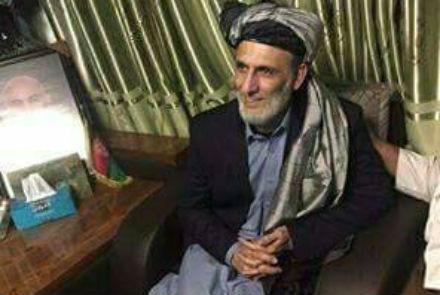The office of Mohammad Sarwar Danish, the second vice president of Afghanistan, on Thursday rejected reports that former Hizb-e-Islami warlord Zardad Faryadi was released from detention on the basis of a letter of guarantee by Danish.
Danish’s office said in a press release that Faryadi was not detained following his return to Kabul and also no letter of guarantee was issued for his release.
There has however been indications that no legal or judicial framework had been outlined to enforce restrictions on Faryadi or keep him under surveillance.
A number of legal experts and political activists meanwhile raised concerns over what they called a culture of impunity that allows criminals to do as they please.
Following his arrival back in Afghanistan after being deported from the UK last week, reports indicated Faryadi had been taken into police custody after landing at Kabul International Airport. But Danish’s office rejected this.
“Zardad Faryadi, after returning to Kabul, was not put in detention; no letter from the address of the second vice president was dispatched to any person or institution to release him,” the statement read.
“In line with article 19, 21 and 158 of the criminal act of Afghanistan and in consideration of the claims which are in place against Zardad Faryadi, the government of Afghanistan has the right to further investigate Mr Faryadi,” said Wahid Farzayee, a member of the Lawyers Union of Afghanistan.
According to legal experts, despite Faryadi’s imprisonment in the UK, those who have claims against him may still have the right to file a complaint against Faryadi.
“In the legal and judicial perspective Zardad Faryadi is a war criminal, because he has committed a lot of human rights violations; the government needs to take proper action in this respect,” said political analyst Hamid Saboori.
“Zardad Faryadi’s case is an example of the overall human rights violations in Afghanistan and also is an example of the culture of impunity,” political activist Asif Ashna said.
Faryadi has been accused of war crimes and human rights violations.
This development takes place a day after Human Rights Watch (HRW) raised concerns over the release of Faryadi, saying his release puts the lives of witnesses, who testified against him in 2005, at great risk.
HRW researcher Patricia Grossman has called on Afghanistan's President Ashraf Ghani to protect these witnesses.
In 2005, during Faryadi’s trial in the U.K, 16 witnesses testified against him. Grossman was one of them.
"I stood in the witness box in a courtroom at the Old Bailey, London's historic Central Criminal Court, to testify in the case of Faryadi Sarwar Zardad, an archetypal Afghan warlord who in the 1990s abducted and tortured travelers on a stretch of road he controlled east of Kabul," says Grossman.

